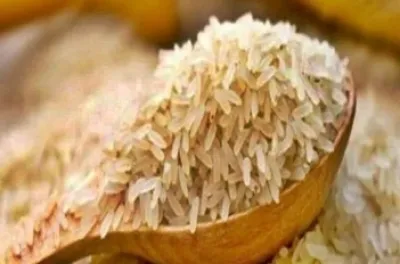How is the Iran-Israel Conflict Affecting Basmati Rice Exports?

Synopsis
Key Takeaways
- Over 100,000 tonnes of basmati rice are currently stuck at Indian ports.
- Iran accounts for 18% to 20% of India's rice exports.
- Prices have already dropped by Rs 4 to Rs 5 per kilogram.
- Exporters face a potential cash crunch if the conflict continues.
- Lack of insurance coverage during wartime poses a significant risk.
New Delhi, June 22 (NationPress) The escalating tensions between Iran and Israel are significantly impacting India's basmati rice industry. Exporters expressed concerns on Sunday about an impending payment crisis and dramatic price reductions if the situation does not stabilize soon.
According to the President of the All India Rice Exporters Association, Satish Goyal, more than 100,000 tonnes of basmati rice destined for Iran is currently stranded at Indian ports.
"Iran is a crucial market for us, accounting for about 18% to 20% of India's total rice exports. Annually, we send nearly 1 million tonnes of basmati rice to them," Goyal informed IANS, voicing significant concern regarding the ongoing disruptions.
Although there has not been a complete cessation of trade, delays in shipments and uncertainties surrounding payments are likely to lead to serious financial challenges.
"If this conflict persists, the local market will begin to experience a cash crunch. Prices have already decreased by Rs 4 to Rs 5 per kilogram, and further deterioration of the situation could exacerbate this decline," he stated.
A critical issue for exporters is the absence of insurance coverage during wartime.
"Insurance companies do not provide coverage for war risks for vessels entering conflict zones. This means exporters would incur the entire loss if incidents occur during transport," Goyal highlighted.
The situation deteriorated further following the involvement of the United States in the conflict. "We were hopeful for a resolution, but now it appears unlikely. The U.S. presence has added to the uncertainty," he remarked.
Karnal in Haryana, a vital center for basmati rice exports, contributes approximately 25% to 30% of India's total export volume in this category.
"Exporters from this region have been engaged in trade with Iran for the past 15 to 20 years without encountering such disruptions," Goyal added.
A meeting with Union Commerce and Industry Minister Piyush Goyal is scheduled for June 24 to address the crisis.
"We have already initiated discussions with the government and are hopeful for assistance to navigate this challenging period," he concluded.






